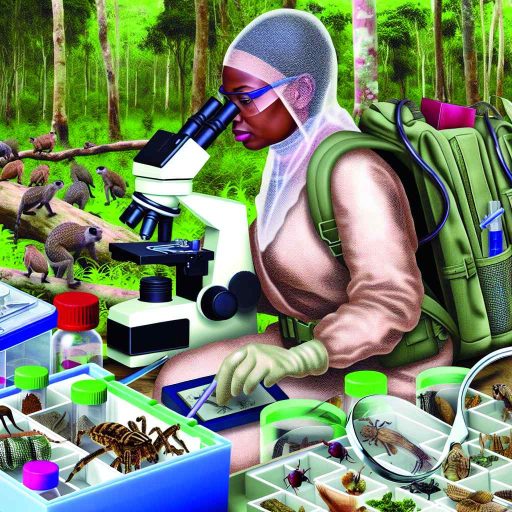Introduction
Geophysics plays a crucial role in understanding and protecting the environment through various applications.
It involves the study of the Earth’s physical properties using techniques like seismic surveys and electromagnetic methods.
Overview of Geophysics and Its Importance in Environmental Applications
Geophysics helps in mapping underground structures, monitoring groundwater contamination, and assessing soil quality.
By providing valuable data, geophysics assists in decision-making for environmental management and remediation projects.
Brief Background on Geophysics in Nigeria
In Nigeria, geophysics has been instrumental in exploring for oil and gas reserves due to its rich resource potential.
Furthermore, geophysical surveys have been used to assess environmental impacts of mining activities and natural hazards in the country.
Importance of Environmental Applications of Geophysics in Nigeria
Geophysics plays a crucial role in addressing various environmental challenges faced by Nigeria.
These challenges include pollution and natural disasters.
-
Identifying sources of pollution and monitoring the spread of contaminants in the environment.
-
Assessing the impact of pollution on soil, water, and air quality.
-
Providing valuable data on the extent of environmental degradation to aid in decision-making and planning.
-
Enabling policymakers and stakeholders to develop effective strategies for environmental protection and remediation.
-
Early detection and monitoring of natural disasters such as landslides, earthquakes, and flooding.
-
Crucial information for disaster preparedness, mitigation, and response efforts.
-
Contributing to promoting sustainable development and resource management in Nigeria.
-
Identifying potential natural resources and assessing their distribution and exploitation potential.
-
Mapping subsurface structures and geological features to aid in sustainable land use planning and conservation.
The environmental applications of geophysics in Nigeria are essential for addressing environmental challenges.
They provide valuable data for decision-making and promote sustainable development and resource management.
Geophysical Techniques in Environmental Applications in Nigeria
Geophysical techniques play a vital role in environmental applications in Nigeria.
These techniques provide valuable information for resource management and hazard mitigation.
Ground Penetrating Radar (GPR) for Mapping Subsurface Features
Ground Penetrating Radar (GPR) is a non-invasive geophysical method.
This method uses radar pulses to image the subsurface.
In Nigeria, GPR is widely used for mapping subsurface features.
It helps in locating buried utilities, archaeological artifacts, and soil layers.
The high resolution of GPR allows researchers to identify shallow subsurface structures with detail.
This makes GPR an effective tool for environmental investigations.
By mapping subsurface features, GPR aids in urban planning, construction projects, and environmental studies.
Seismic Surveys for Studying Earth’s Structure and Detecting Potential Hazards
Seismic surveys are commonly used in Nigeria to study the earth’s subsurface structure.
These surveys help detect potential hazards such as faults, fractures, and underground cavities.
By generating shock waves and recording their echoes, seismic surveys provide valuable information about the earth’s crust.
They are crucial for understanding seismic risks in Nigeria.
This region is prone to earthquakes and other natural disasters.
By mapping subsurface geology and identifying potential hazards, seismic surveys assist in land use planning.
They also contribute to infrastructure development and disaster preparedness.
Electrical Resistivity Tomography (ERT) for Groundwater Exploration and Contamination Studies
Electrical Resistivity Tomography (ERT) is a geophysical method used in Nigeria for groundwater exploration.
It is also used for contamination studies.
By measuring the electrical resistivity of the subsurface, ERT can map underground water bodies and aquifers.
In Nigeria, access to clean water is a critical issue.
ERT plays a crucial role in locating groundwater resources and monitoring water quality.
By identifying sources of contamination and assessing aquifer vulnerabilities, ERT supports water resource management.
This method contributes to environmental protection.
Gain More Insights: Government Policies on Environmental Biology in Nigeria
Case Studies of Environmental Applications of Geophysics in Nigeria
- Monitoring land subsidence in the Niger Delta region
Geophysics has been instrumental in monitoring land subsidence in the Niger Delta region. Rapid urbanization and industrial activities have put pressure on the land. By utilizing techniques such as ground-penetrating radar and satellite imaging, geophysicists can detect subtle changes in ground level over time. This information is crucial for urban planning and infrastructure development to mitigate the effects of subsidence on buildings and roadways. - Detecting and mapping groundwater pollution in urban areas
Geophysics plays a vital role in detecting and mapping groundwater pollution in urban areas. Industrial activities and waste disposal can contaminate underground water sources. By using methods like electrical resistivity imaging and seismic refraction, geophysicists can identify the extent and pathways of groundwater contamination. This helps authorities to design effective remediation strategies to protect public health. - Assessing seismic hazards in Lagos and other high-risk zones
In high-risk zones like Lagos, where the population density is high, geophysics is essential for assessing seismic hazards. Through techniques such as micro-seismic monitoring and fault mapping, geophysicists can determine the likelihood and impact of seismic events. This provides valuable information for engineers and policymakers to implement building codes and emergency preparedness plans to minimize the risk of earthquake damage.
See Related Content: Prominent Nigerian Applied Botanists to Know
Challenges and Limitations in Utilizing Geophysics for Environmental Applications in Nigeria
One of the major challenges in utilizing geophysics for environmental applications in Nigeria is the limited funding and resources available in the country.
Many environmental projects require significant financial investments, which are often lacking in Nigeria.
This lack of funding makes it difficult to carry out comprehensive geophysical surveys and analyses, hindering the effectiveness of environmental applications.
Limited funding and resources
Another challenge in utilizing geophysics for environmental applications in Nigeria is the lack of skilled personnel and expertise in the field.
Geophysics is a specialized discipline that requires trained professionals with the knowledge and experience to interpret data accurately and make informed decisions.
Transform Your Career with Expert Guidance
Get personalized mentorship consulting that’s tailored to your unique path. Our expert advice is actionable and exclusive.
Get StartedHowever, there is a shortage of qualified geophysicists in Nigeria, making it challenging to effectively use geophysical techniques for environmental purposes.
Lack of skilled personnel and expertise
In Nigeria, many environmental applications of geophysics are needed in remote and conflict-prone regions, such as the Niger Delta.
However, accessing these areas can be difficult due to security concerns and lack of infrastructure.
This poses a challenge to conducting geophysical surveys and gathering data in these critical areas, limiting the scope and effectiveness of environmental applications.
Accessibility to remote and conflict-prone regions
Discover More: Career Opportunities in Applied Microbiology Nigeria

Future Prospects and Opportunities for Environmental Geophysics in Nigeria
As technology continues to advance, there is a great opportunity to integrate advanced geophysical technologies in environmental studies in Nigeria.
These technologies can provide more accurate and detailed data on the state of the environment, helping to identify potential risks and hazards.
The use of remote sensing technology, drones, and advanced geophysical instruments can greatly enhance the efficiency and effectiveness of environmental geophysics in Nigeria.
By utilizing these tools, geophysicists can collect data from remote and inaccessible areas, making it easier to conduct comprehensive environmental assessments.
Furthermore, the integration of data analytics and machine learning algorithms can help geophysicists analyze and interpret large volumes of data quickly and accurately.
This can lead to more informed decision-making and the identification of patterns and trends that may not be immediately apparent.
By embracing advanced technologies and data analytics, Nigeria can enhance its environmental monitoring and assessment capabilities, ultimately leading to more sustainable and effective environmental management practices.
Integration of Advanced Technologies and Data Analytics
Collaborating with international organizations and research institutions can provide valuable opportunities for knowledge exchange and capacity building in the field of environmental geophysics.
International partnerships can facilitate the sharing of expertise, resources, and best practices, ultimately enhancing the quality and impact of environmental studies in Nigeria.
Through collaborations with international partners, Nigerian geophysicists can gain access to cutting-edge technologies, training programs, and research opportunities.
This can help to bridge the gap between local expertise and global advancements in environmental geophysics, leading to innovations and breakthroughs in the field.
International collaborations also offer the chance to participate in joint research projects, workshops, and conferences, fostering a culture of collaboration and learning within the geophysics community in Nigeria.
By working together with international partners, Nigerian geophysicists can contribute to global environmental efforts and make valuable connections with experts from around the world.
Collaborations with International Organizations and Research Institutions
Investing in capacity building and training programs is essential for the future of environmental geophysics in Nigeria.
By providing opportunities for local geophysicists to enhance their skills and knowledge, Nigeria can foster a new generation of experts who are equipped to tackle the environmental challenges of the future.
Training programs can cover a wide range of topics, including the latest geophysical techniques, data analysis methods, and tools for environmental monitoring and assessment.
By offering hands-on training and practical experience, these programs can help geophysicists develop the skills they need to conduct impactful research and make informed decisions.
Capacity building initiatives can also focus on mentoring and knowledge transfer, pairing experienced geophysicists with early-career professionals to share expertise and provide guidance.
This can help to build a strong foundation for growth and innovation within the geophysics community in Nigeria, ensuring continuity and sustainability in environmental research and management efforts.
Ultimately, by investing in capacity building and training programs, Nigeria can empower its local geophysicists to lead the way in environmental research and contribute to the sustainable development of the country.
This will not only strengthen the field of environmental geophysics in Nigeria but also have a positive impact on the broader environmental landscape of the region.
Learn More: Overview of Applied Geology Curriculum in Nigeria
Geophysical Contributions to Environmental Sustainability
Geophysics plays a crucial role in addressing environmental issues in Nigeria.
It provides valuable data for research and decision-making.
Investment and support for environmental geophysics research should be increased.
This will further enhance environmental sustainability in Nigeria.
Additional Resources
Cyril D. Boateng (PhD) – Principal Investigator (Digging Deep into …




